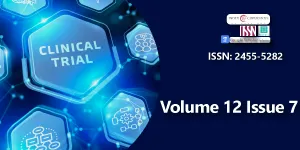Extension of Medical Decision-making Connecting ‘Spiritual Intelligence’
Main Article Content
Abstract
Abstract
Undue postoperative pain and suffering can often be minimized if a surgeon incorporates conscientious compassion and integrates spiritual intelligence, commonly referred to as SQ.
SQ is considered the “ultimate” intelligence and underpins the effective functioning of both Intellectual (IQ) and Emotional (EQ) intelligence. It is not about being ‘religious,’ but is supported by recent neurological and psychological research [1]. SQ's potential to enable creativity, reframe situations, and combine multiple forms of intelligence can significantly enhance clinical decision-making at critical moments. In this context, SQ opens new avenues of conscience and compassion, guided by wisdom that transcends self-centered experiences.
This article presents a case in which the author, both a physician and a patient, experienced severe postoperative complications unexpectedly following classical direct inguinal hernia repair one year apart by two reputable general surgeons. A simple, yet overlooked step—ensuring thoughtful and thorough desufflation(deflation) of CO2 from both extraperitoneal and ‘intraperitoneal’ spaces, if suspected, could have minimized or prevented much of the distress, if conscientious compassion had ever been utilized at the right moment. This case underscores SQ’s potential to improve outcomes through empathetic, meticulous decision-making beyond ‘standard’ expertise and highlights the crucial role of painstaking care in preventing avoidable suffering. It would reassure the expert audience of the importance of their practices.
Downloads
Article Details
Copyright (c) 2025 Choi JJ.

This work is licensed under a Creative Commons Attribution 4.0 International License.
Zohar D, Marshall I. Connecting with our Spiritual Intelligence. New York: Bloomsbury Publishing; 2000;3-17.
Morrison Z, Kashyap S, Nirujogi VL. Adult Inguinal Hernia [Internet]. Treasure Island (FL): StatPearls Publishing; 2024. Available from: https://www.ncbi.nlm.nih.gov/books/NBK537241/
EU Hernia Trialists Collaboration. Repair of groin hernia with synthetic mesh: meta-analysis of randomized controlled trials. Ann Surg. 2002;235(3):322-332. Available from: https://doi.org/10.1097/00000658-200203000-00003
Lee CS, Kim JH, Choi BJ, Lee JI, Lee SC, Lee YS, et al. A retrospective study on the prevalence of recurrent inguinal hernia: a large-scale multi-institutional study. Ann Surg Treat Res. 2020;98(1):51-55. Available from: https://doi.org/10.4174/astr.2020.98.1.51
Søndenaa K, Nesvik I, Breivik K, Kørner H. Long-term follow-up of 1059 consecutive primary and recurrent inguinal hernias in a teaching hospital. Eur J Surg. 2001;167(2):125-129. Available from: https://doi.org/10.1080/110241501750070583
Choi JJ, Choo BH. The Buddha’s empirically testable “Ten Criteria” challenges the authenticity of truth claims: a critical review and its potential applicability to debunking the various post-truths. Religions. 2019;10(12):645. Available from: https://doi.org/10.3390/rel10120645

